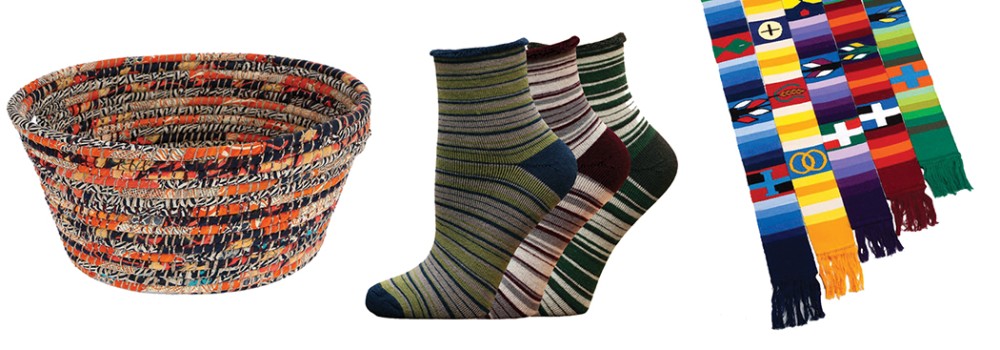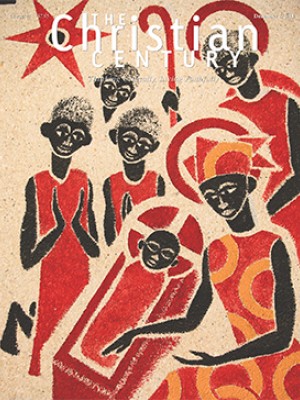
A carved wooden crocodile was my introduction to giving and receiving fair trade gifts. My grandmother got it for me from Self Help Crafts, as it was then called, a company selling items made by global artisans.
At that time, Paul Myers was executive director and CEO of the company, which received a much-needed name change to Ten Thousand Villages in 1996. He was also the elected president of the World Fair Trade Organization for nine years.
Myers, who is now retired (and a member of the same congregation as I am), emphasizes that fair trade places “people before profits” all along the chain, “from the raw materials to the production to the various quality controls to the point where the consumer gets the product at a fair and reasonable price.”
Read our latest issue or browse back issues.
With a background in economics, Myers has worked internationally on solving local income problems.
“For chronic poverty I do not think there is a better solution than fair trade that treats it as an exchange and honors people’s dignity at every step along the way,” he said. “It can have a substantial effect on a community, a family—I’ve seen it happen.”
Over the decades, companies have debated whether the purpose of fair trade is primarily promoting a business or educating the public to advocate for changing general trade practices. As Myers frames the question: “Is it more important for us to sell or to tell?”
The artisans who produce the goods often emphasize the importance of sales, but they’ve found that stories about the producers can be compelling and that they matter to people when they choose to pay more for some fair trade products than they might otherwise.
Fair trade gifts have come a long way from the wooden carvings and knickknacks of my childhood Christmases. And fair trade companies have become more adept at knowing what customers want and how to produce it. Now Ten Thousand Villages offers decorative and functional home goods, including dishes, table linens, and table lamps. A favorite of mine is the Bright Day Laundry Basket. It’s an alternative to plastic and is delightfully colorful, made from recycled saris wrapped around a woven grass basket in Bangladesh.
Two other fair trade stores that are go-tos for me in gift giving are Fair Indigo and Maggie’s Organics. Both offer a variety of clothes and accessories made in the United States and abroad using ethical labor standards. Maggie’s Organics is an especially great source for wool socks to keep everyone’s feet warm.
I invited some of my colleagues to tell me about their favorite businesses and social enterprise ventures where they can spend their money in a way that also supports their values. Poetry editor Jill Peláez Baumgaertner told me about Amish Spirit quilters, which she said makes beautiful gifts for memorable occasions. “The quilts are handmade by women of an Old Order Amish community in rural Pennsylvania. Each quilt, made by one woman, takes three to four months to complete. In addition to the full-sized quilts, Amish Spirit also sells infant quilts (my favorite for special babies) and handwoven rugs.”
Amy Frykholm, associate editor, mentioned Better World Books, which she discovered when looking for alternatives to Amazon. “I have blamed Amazon for trying to ruin everything that I loved in the book-buying world, but as a person living in a small town, I need an online source for books,” she said. “Better World Books was started in 2003 by two graduates of Notre Dame. It has grown into a thriving enterprise that includes literacy and environmental ventures. The company boasts of more than 26 million books donated across the globe, more than $28 million in funds raised for literacy and libraries worldwide, and more than 318 million recycled volumes. For me, it has become my first-stop shop for books.”
David Heim, editor in chief, spoke about MayaWorks. “When I was looking to buy a stole, some friends told me about the beautiful handwoven stoles made by indigenous artisans in the highlands of Guatemala and distributed by MayaWorks. Besides offering a market for items made by Maya women, MayaWorks partners with women to provide training, microloans, literacy classes, and school scholarships. The stoles, which feature brilliant renditions of Christian symbols, are one of MayaWorks’ most popular items, but the company also sells bags, scarves, and jewelry.”
Books editor Elizabeth Palmer said she tends to give people things she likes herself—and near the top of the list is fair trade coffee. “I’d fallen in love with Lutheran World Relief’s dark roast Farmer’s Market coffee, which is acquired through direct partnerships with farmers and has a subtle but persistent earthy flavor. Then I tasted Equal Exchange’s fair trade Organic Midnight Sun, and I realized that it’s possible to be equally in love with two very different flavors. The bold, complex Midnight Sun is not for the faint of heart. It’s for people who like the darkest chocolates, the bitterest beers, the most full-bodied red wines.”
She’s treating some of her friends who live locally to a meal at the social enterprise coffee shop, Curt’s Café. “Curt’s provides internships for teenagers and young adults who are homeless, formerly incarcerated, or otherwise at risk. Working in the café is only a portion of the training program, but it’s where interns get to interact directly with neighborhood coffee lovers. From lattes to soups to smoothies to sandwiches, everything these young adults serve is beautifully crafted.”
Also thinking locally, Steve Thorngate, associate editor, said he’s convinced ethical shopping begins with local stores, “with keeping my money in the community, in my neighbors’ businesses and wages.” Two of his favorite places in Skokie, Illinois, where he lives, are the hardware store and the thrift store.
“Skokie Ace is the oldest continuously operated business in town. The Ace brand—not a corporate chain but a professional association owned by its member stores—provides the buying power to compete on prices. Where the big boxes can’t compete with Skokie Ace is service. If you show up looking for an unusual tool, you’re directed to an old-timer downstairs who also offers advice. Once I thought I needed a particular wrench and he disagreed, so instead of selling me one, he lent me his so I could see for myself.
“A few blocks down Oakton Street is Second Time Around, the best kind of thrift store: affordable, eclectic, well organized. Like a lot of thrift stores, it’s run for the benefit of a local nonprofit—in this case Shore Community Services, which serves people with disabilities. Somebody keeps donating sweaters I like, so I’m all set for winter. I hope the people on my gift list like secondhand sweaters, too.”
A version of this article appears in the print edition under the title "Gifts that give twice."







